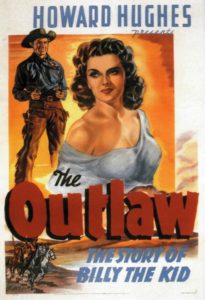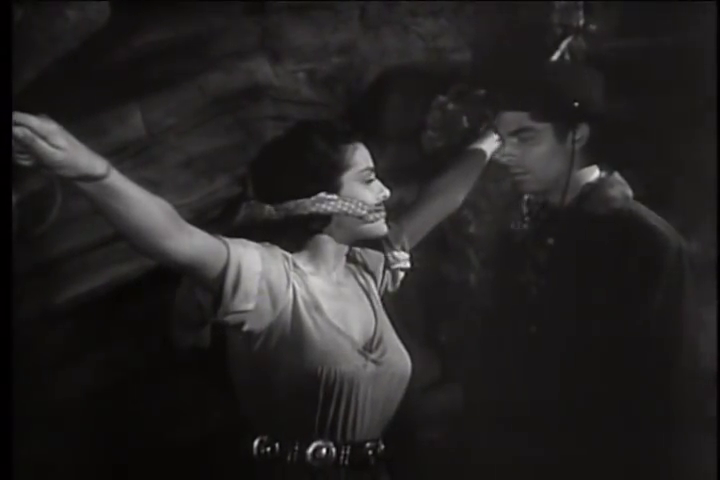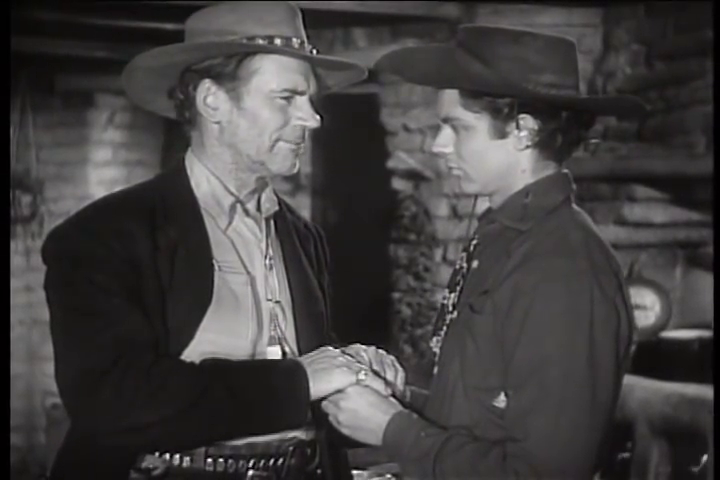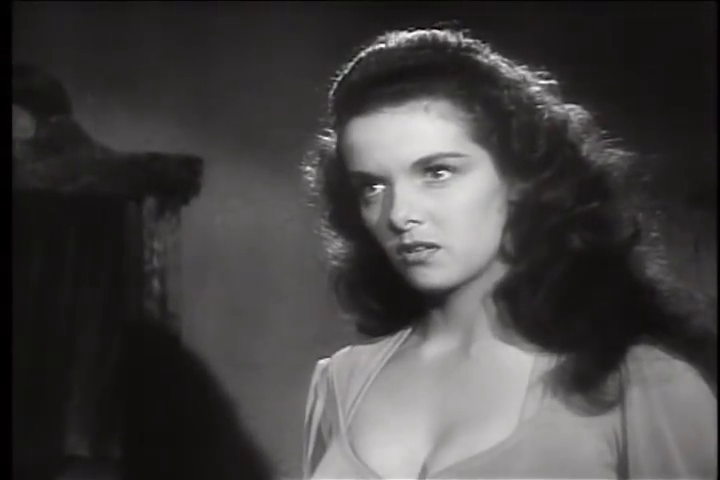Outlaw, The (1943)
“Ever since you met him, you’ve treated me like a dog!”
|
Synopsis: |
|
Genres, Themes, Actors, and Directors:
Response to Peary’s Review:
Ironically, while the film does place ample emphasis on Russell’s photogenic bosom, the film is less focused on sexual dynamics between Russell and her two lovers than on, as Robert Lang notes in his book Masculine Interests: Homoerotics in Hollywood Films:
Regardless of whether one reads the relationship between Huston and Beutel as sexual or not, it’s undeniable that the real “love triangle” here is between these men (who take an instant liking to one another, for no discernable reason) and Mitchell. In his review, however, Peary simply points out that “after a while there’s too much male talk and not enough about Russell”, adding that it’s “hard to believe” the “very pretty, buxom, teenage girl in the tight, revealing dresses” is “the same actress who’d confidently sing, dance, and be funny with Marilyn Monroe ten years later in Gentlemen Prefer Blondes (1953).” The film itself, unfortunately, is a tonally inconsistent chore to sit through. Peary writes that the “comedy and music are intrusive”, but this is an understatement: Victor Young’s score is atrociously inappropriate for the melodramatic material, which doesn’t work as a comedy. Meanwhile, the film is at least half an hour too long, and Hughes didn’t know how to elicit strong performance from his leads. While the reasons for Beutel’s limited career are contested, it seems clear to me that he was more of a pretty face than a talented actor; as noted previously, it’s challenging to understand why Huston feels such loyalty for him. Redeeming Qualities and Moments: Must See? Links: |





One thought on “Outlaw, The (1943)”
First viewing – not must-see.
For years, I had made the assumption that this wasn’t much of a film, and didn’t go out of my way to see it. (It seems to always be on YouTube, one way or the other, but still I passed it by.)
Now that I’ve actually seen it… well, as it turns out, I don’t think it’s much of a film but I was surprised that it’s more or less watchable and even occasionally engaging. Once I noticed that the screenplay was by the pro Jules Furthman (who is credited with ‘To Have and Have Not’, ‘The Big Sleep’ and – one of my faves – ‘Nightmare Alley’ right after this), I allowed myself a little hope that it wouldn’t be a snooze. (It seems Furthman also often jumped in to direct near the end of filming.)
Probably the worst that it is is sluggish all too often. (And I agree that it’s about a half-hour too long.) But even if Beutel’s performance leaves a fair amount to be desired, Huston and Mitchell are working hard-enough to give the film some bounce. And I don’t think Russell is all that bad – considering the limits of her role. I think she even throws in some nice under-playing once in awhile.
According to Wikipedia, Howard Hawks was the original director and did do some of this – and that makes some sense. (It may also explain why Huston and Mitchell agreed to be in it in the first place. Hughes had to take over when Hawks abandoned the project.)
But it would have been nice if someone had pulled in the reins on Young’s too-often over-bearing score – yikes! When he isn’t offering either something oppressively dramatic or oppressively ‘romantic’, he augments with orchestral zaniness that’s more appropriate for cartoons (or maybe Young actually thought it was appropriate for some of the goofier ‘guy stuff’, but it’s still weird).
Personally, I don’t see much evidence of DP Gregg Toland having been called on to do much that reveals his strengths as a world-class cinematographer. (He apparently suddenly replaced Lucien Ballard.)
As for the homoerotic aspect… yes, I suppose it’s either there to some degree or it could be interpreted as being there. Though another reading could be that Holliday admires The Kid for his enviable youth as well as his notorious nature. He may see something of his younger self in ‘the young buck’. (Without more genuine talent on Beutel’s part, it’s a little harder to say.) At any rate – I’m gay, and I wasn’t seeing all that much in terms of real sexual attraction – or related jealousy on Mitchell’s part.